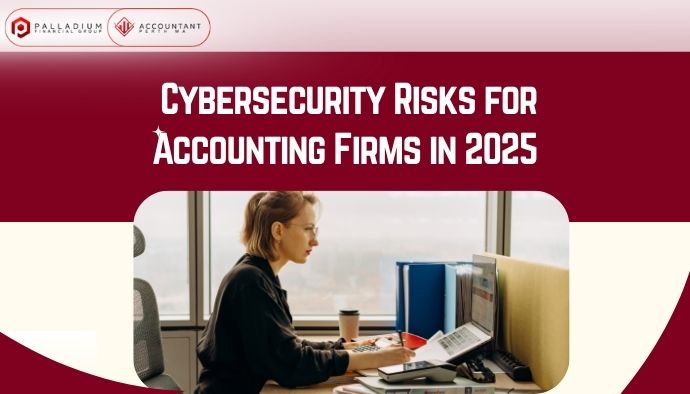
Accounting firms have to manage lots of sensitive financial data, which makes them a prime target for cyber threats. This includes phishing attacks, ransomware attacks, and more. The rise of such cybersecurity risks for accounting firms is growing faster. Thus, protecting clients’ information and financial records is highly important.
In this aspect, this blog presents five key threats that financial firms face and how you can avoid them.
Cybercriminals are becoming smarter day by day, and they are constantly coming up with new ways to steal your data, destroy it, or lock you out of your files. The most common cybersecurity risks for accounting firms are mentioned below:
Ransomware is one of the most dangerous cyber threats out there right now. It happens when cybercriminals hack into your computers, lock your files, and demand payment to unlock them. But in 2025, the issue is not only about locking into your system, but they also steal the data. They specifically attack accounting firm cybersecurity firewalls to get access to confidential client information. This information can be bank accounts, tax returns, and payroll systems.
Furthermore, ransomware attacks can halt business operations for days and lead to costly legal liabilities. Thus, establish a ransomware protection accounting system to document your cybersecurity investments and track how well they safeguard your financial data.
Over the past few years, phishing emails have drastically transformed and look identical to authentic websites. In 2025, some of them will also be created with the help of AI. Through phishing attacks, intruders pretend to be a partner or manager, and they ask for payment transfers or login information. It can result in leaking sensitive business information and can impact your overall operations.
Moreover, phishing is especially dangerous in BEC accounting firms, where attackers impersonate executives to authorise fraudulent financial actions.
This one happens when cybercriminals use leaked or stolen login details to access your systems. They may buy these credentials from the dark web or use a tactic called credential stuffing. It happens when they try known password combinations across many accounts.
For instance, if someone in your firm reuses the same password for multiple accounts, then they are more prone to be hacked.
You may have already been using multiple outsourced tools like cloud accounting platforms, tax software, or e-signature services. These services are useful, but they also create security gaps. For instance, if one of your providers gets hacked, then it can also transfer your sensitive information to intruders. These data breaches are popularly known as supply chain attacks, and they are getting more common.
Many firms overlook cybersecurity for accountants when integrating third-party tools, which makes them exposed to indirect threats.
In your workspace, many old systems or softwares may work fine, but they are not safe. Once a vulnerability has been discovered in them, it’s often published online. In this situation, if you didn’t remove these applications and devices, then attackers can break into your systems.
Besides this, one growing concern is AI deepfake fraud accountants, where old systems lacking modern detection tools are especially vulnerable to audio and video deception.
Staying ahead of cyberthreats requires a strategic, organisational-wide commitment to security. By integrating advanced technologies, educating staff about cyberattacks and prevention steps, and keeping a stronger vendor relationship allows your accounting firm Perth to be protected from cyberattacks.
Read Also: Questions to Ask Before Hiring a Personal Tax Accountant